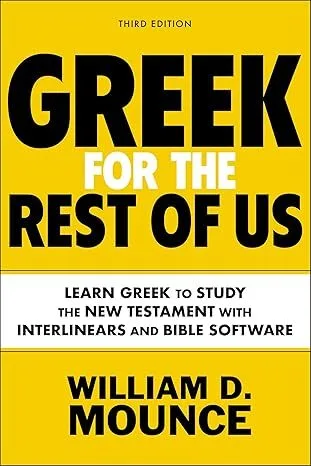Pronunciation Guide: hek-oo-see’-ose (with emphasis on “see”)
Basic Definition

Key Information
ἑκουσίως

Strong’s Entry
g1596
Strong’s G1596: ἑκουσίως (hekousiōs) fundamentally means “voluntarily, willingly, or deliberately.” It describes an action done by choice rather than by compulsion or necessity. This adverb emphasizes the involvement of the will, highlighting intentional decisions made with full awareness. In biblical contexts, it often carries moral and spiritual weight, pointing to the deliberate nature of one’s actions before God.
Etymology and Morphology
- Adverb derived from the adjective ἑκούσιος (hekousios), meaning “willing” or “voluntary”
- Root connection to ἑκών (hekōn), meaning “willingly” or “of one’s own accord”
- Appears rarely in the New Testament (only twice)
- Used primarily in didactic (teaching) passages
- Contains the idea of internal motivation rather than external pressure
ἑκουσίως Morphology:
- ἑκουσίως (adverbial form) – willingly, voluntarily
- ἑκούσιος (masculine nominative singular) – willing, voluntary
- ἑκουσίου (masculine/neuter genitive singular) – of what is willing/voluntary
- ἑκούσιον (neuter nominative/accusative singular) – willing/voluntary thing
- ἑκούσιοι (masculine nominative plural) – willing/voluntary ones
Origin & History
The term ἑκουσίως emerges from classical Greek, where it was used to distinguish actions performed with intention and willingness from those done under compulsion. In Thucydides’ “History of the Peloponnesian War,” he employs the concept to distinguish between voluntary political alliances versus forced subjugation. The term gained particular importance in legal contexts, where Aristotle in his “Nicomachean Ethics” uses the related form to distinguish between voluntary and involuntary actions when determining moral responsibility.
In the Septuagint (LXX), the Greek translation of the Hebrew Scriptures, ἑκουσίως appears in Ezra 1:6 and 2:68 describing the freewill offerings given for the rebuilding of the Temple. This established an important theological precedent connecting willing action with proper worship. The voluntary nature of these offerings was seen as enhancing their value before God, establishing a pattern that would continue into New Testament theology where the willingness of heart behind an action determines much of its spiritual significance.
Expanded Definitions & Translation Options
- A deliberate choice made with full awareness and intent
- An action performed without external compulsion
- The exercise of one’s will in a specific direction
- A decision made freely, without coercion
- A voluntary act reflecting internal motivation rather than obligation
ἑκουσίως Translation Options:
- “Willingly” – Emphasizes the presence of desire and eagerness in the action
- “Voluntarily” – Highlights the absence of coercion or external pressure
- “Deliberately” – Focuses on the conscious, intentional nature of the choice
- “By choice” – Underscores the exercise of free will in the action
- “Of one’s own accord” – Captures the self-motivated aspect of the action without external prompting
Biblical Usage
In the New Testament, ἑκουσίως appears only twice, yet in theologically significant contexts. Its first occurrence is in Hebrews 10:26, where the author warns about the serious consequences of willingly [ἑκουσίως] continuing in sin after receiving knowledge of the truth. This usage reveals that the deliberate, chosen nature of sin after enlightenment carries particular weight in God’s eyes. The term here conveys not just occasional failure but a determined choice to reject known truth.
The second appearance is in 1 Peter 5:2, where Peter exhorts elders to shepherd God’s flock willingly [ἑκουσίως], not under compulsion. This positive application highlights that genuine spiritual leadership must flow from internal motivation rather than external pressure. Together, these uses establish that ἑκουσίως deals with matters of serious moral and spiritual consequence, where the heart’s volition significantly affects the nature and value of the action.
- “For if we go on sinning willingly [ἑκουσίως] after receiving the knowledge of the truth, there no longer remains a sacrifice for sins.” Hebrews 10:26
- “Shepherd the flock of God among you, exercising oversight not under compulsion, but voluntarily [ἑκουσίως], according to the will of God; and not for sordid gain, but with eagerness.” 1 Peter 5:2
Cultural Insights
In ancient Greco-Roman society, the concept of voluntary action had significant legal implications. Roman law made important distinctions between actions done willingly (voluntās) versus those done under duress. This legal framework would have informed how the original readers understood the warnings in Hebrews 10:26. The audience would have recognized that claiming ignorance or coercion would not provide exemption from consequences when one had willingly chosen to sin against known truth.
In Jewish sacrificial practice, the distinction between voluntary offerings (נְדָבָה, nedabah) and obligatory ones was deeply meaningful. The voluntary offerings were considered especially precious to God because they represented genuine devotion beyond mere obligation. This cultural background illuminates Peter’s exhortation to elders to serve willingly (ἑκουσίως) rather than by compulsion. Just as a freely given sacrifice held special value in Temple worship, so leadership motivated by willing devotion rather than duty carries unique spiritual weight. This reflects the Jewish understanding that כַּוָּנָה (kavvanah, intention) is essential to genuine worship and service.
Theological Significance
The term ἑκουσίως reveals profound insights about divine justice and human responsibility. In Hebrews 10:26, the willful nature of continued sin after enlightenment highlights that God’s judgment accounts for our level of knowledge and intentionality. This reflects יהוה’s perfect justice, which considers not just actions but the heart behind them. Unlike human justice systems, God perfectly discerns between sins of ignorance and willful rebellion, responding to each with appropriate measures of justice and mercy.
The appearance of ἑκουσίως in 1 Peter 5:2 reflects the heart of the Messiah Himself, who taught that the greatest in the Kingdom are those who serve willingly, not seeking position or power (Matthew 20:25-28). This willing service reflects the character of Yeshua, who voluntarily laid down His life (John 10:18). True spiritual leadership mirrors this willing self-sacrifice. The term thus points to the transformative power of divine grace, which changes our hearts so that we begin to serve not from compulsion but from willing joy—the very nature of God Himself, who gives freely and abundantly out of His generous character.
Personal Application
Understanding ἑκουσίως challenges us to examine our motivations in both sin and service. When we find ourselves repeatedly choosing actions we know contradict God’s truth, we must recognize the seriousness of willful sin. The warning in Hebrews reminds us that continued, deliberate rebellion after receiving light carries greater consequences than sins of ignorance or weakness. This should prompt sincere self-examination and repentance where needed.
Conversely, ἑκουσίως invites us to cultivate a heart that serves God and others with genuine willingness rather than grudging obligation. Whether in leadership, giving, worship, or daily obedience, we can ask: “Am I doing this because I must, or because I genuinely desire to?” As we grow in grace, the Holy Spirit transforms our hearts so that we increasingly find joy in willing surrender to God. What began as duty gradually becomes delight—the surest sign that His love is perfecting us from the inside out.
Related Words
- προθύμως (prothymōs, “eagerly”) – Goes beyond mere willingness to express enthusiasm and zeal; adds the element of readiness and forward-leaning desire to ἑκουσίως. See G4290
- αὐθαίρετος (authairetos, “of one’s own accord”) – Emphasizes self-motivation and personal initiative without external prompting; stronger than ἑκουσίως in stressing the self-originating nature of the action. See G830
- ἀκουσίως (akousiōs, “unwillingly”) – The direct opposite of ἑκουσίως, describing actions done involuntarily or under compulsion; helps define ἑκουσίως by contrast. See G210
- ἀναγκαστῶς (anankastōs, “by compulsion”) – Describes action undertaken under necessity or force; stands in direct contrast to ἑκουσίως in 1 Peter 5:2. See G317
- προαιρέομαι (proaireomai, “to purpose, choose”) – Refers to deliberate choice made beforehand; relates to ἑκουσίως in its emphasis on intentional decision. See G4255
Did you Know?
- Did you know that in ancient Athens, courts distinguished between crimes committed ἑκουσίως (willingly) and those committed in ignorance or accident? The penalties differed dramatically based on this distinction, with willful wrongdoing receiving much harsher punishment. This legal principle illuminates the warning in Hebrews 10:26 about sinning willfully after receiving knowledge of the truth—it represents a higher level of accountability before God’s perfect justice.
- Did you know that modern psychology confirms what Scripture teaches about willingness? Studies show that intrinsic motivation (doing something because you want to) produces greater satisfaction and better results than extrinsic motivation (doing something for reward or to avoid punishment). When Peter urged elders to shepherd God’s flock ἑκουσίως (willingly), he was tapping into a profound psychological and spiritual truth that willing service transforms both the server and those being served.
- Did you know that in ancient Jewish thought, the human heart (לֵב, lev) was considered the seat of the will, not just emotions? This understanding shaped how early Messianic believers would have interpreted ἑκουσίως. When they read about sinning “willingly” or serving “voluntarily,” they understood this as referring to the deepest part of a person—their core identity and fundamental orientation toward or away from God. This helps explain why willful sin after receiving light was considered so serious; it represented a rejection of truth at the very center of one’s being.
Remember This
ἑκουσίως reveals that in God’s economy, the willing heart transforms both sin and service—deepening guilt in persistent rebellion but elevating simple acts of obedience into precious offerings when done with joy.
Note: While this entry strives for accuracy, readers engaged in critical research should verify citations and keyword occurrences in their Bible translation of choice. For Biblical citations, the F.O.G Bible project recommends Logos Bible software.
Strong's g1596
Add Comment
God's Word is too vast for a single perspective. We all have a story, and as believers we all carry the Holy Spirit who is the Revealer. With this in mind - I would love to read your comments.




